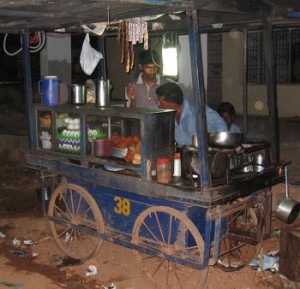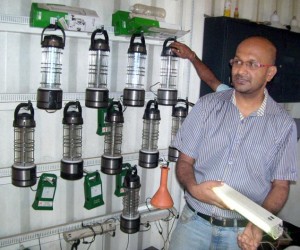SELCO, a leading solar energy company based in Southern India, has been producing and selling solar energy units to the rural poor since 1995. SELCO works alongside state-owned andcooperative-owned banks in India, to provide loans to rural households in order to assist in the upfront costs of the solar lighting. Families that switch to SELCO solar energy products experience both lifetime savings on energy costs and incalculable costs on healthcare that is prevented from cleaner burning energy. In addition to providing homes with cleaner energy, it is also reliable; users cited that SELCO products increased productivity and quality of life.
The company model works by setting up centers in rural areas that are responsible for selling and servicing the products in their vicinity. These centers are small enough that they know their customers and trust has been built between the consumer and the SELCO employee. This is an important relationship since SELCO has taken responsibility for underwriting the loans the “unbankable.” In addition, by placing their centers within close vicinity to the households served, SELCO technicians are able to respond within 36 hours if equipment is in need of repair. It is important to SELCO’s founder, Dr. H. Harish Hande, that SELCO maintain a good reputation with their customers, as trust in the product is a driving factor in the consumer’s choice to buy SELCO’s products.
Six years after inception, SELCO broke even in 2001. Since then, the enterprise has gone through several pivots, investing in R&D, building partnerships and trying to keep its products competitive. Although SELCO hopes to continue to grow at a steady pace, Dr. Hande believes that real impact will only continue by keeping their small-scale model. SELCO management would prefer to assist others in replication of the model (in the North, East and West of India), rather than scaling up their enterprise. As Dr. Hande explains, “It is better if we focus on developing other SELCO’s suited to the context where they would operate, rather than trying to grow this SELCO. Ideally we should create an organization that can become investment partner for entrepreneurial entities – the SELCOs’ of the future. We can provide the seed capital and pass on to them our knowledge, things that we learnt the hard way. However, the new entities will have complete independence in the way they would develop their business, because their specific model needs to be suited to their context. We would like to do this in other parts of India first and thereafter, maybe, across the globe.”
Often, impact investors searching for investable social enterprises seek out businesses that have eventual scalability. Profitability and impact are often examined hand in hand, and evaluated with the same weight, therefore making scalability a vital factor. However, culture context is just one of a slew of issues that prevent many industries from scaling up. Customer trust, social capital and depth of impact are challenges that scale may pose on a social business. Perhaps, as SELCO’s management team would suggest, impact investors should re-evaluate their terms of measurement, examining the real trade-off between scale and impact.
Note: Information gathered and quotes are taken from: Mukherj, Sourav. “SELCO: Solar Lighting for the Poor.” UNDP Case Study: New York, NY, 2011.




